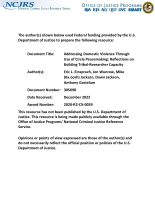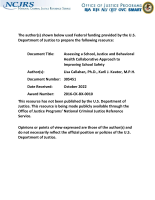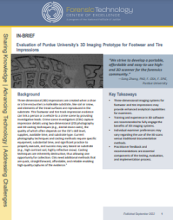Research
Addressing Domestic Violence Through Use of Circle Peacemaking: Reflections on Building Tribal-Researcher Capacity
Understanding, Preventing, and Responding to Human Trafficking
Functionalized Aptamers for Detection of Small-Molecule Targets
Shedding Light on Assault
Embracing Tribal Culture to Build Research Partnerships
NIJ Awards Over $11 Million to Support Forensic Science Research and Development in 2022
On September 30, 2022, NIJ announced $11.6 million in funding to support 23 projects under the “NIJ FY22 Research and Development in Forensic Science for Criminal Justice Purposes” solicitation. Through its research and development grant funding, NIJ continues to advance the speed, accuracy, and reliability of forensic analysis, which ultimately bolsters the...
Assessing a School Justice and Behavioral Health Collaborative Approach to Improving School Safety
Social Media and Domestic Radicalization
Social media has become a potent tool for spreading extremist beliefs and promoting violent extremism. NIJ Social Science analyst Aisha Javed Qureshi joins writer-editor Paul Haskins for a conversation about how scientific research is helping law enforcement and other agencies understand and address this growing concern.







